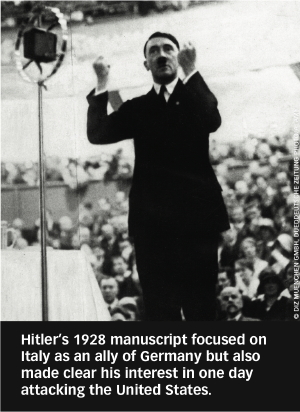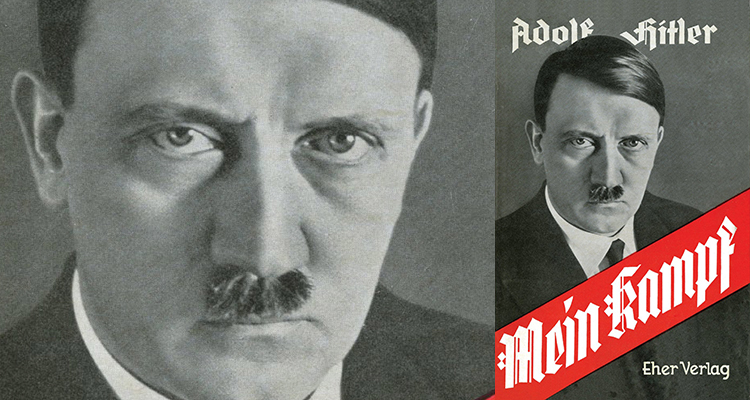 In Mein Kampf, Adolf Hitler laid out a philosophy that would trigger global war. But a later volume, not published in his lifetime, is at least as shocking as his notorious My Struggle.
In Mein Kampf, Adolf Hitler laid out a philosophy that would trigger global war. But a later volume, not published in his lifetime, is at least as shocking as his notorious My Struggle.
Hitler’s second book wasn’t suppressed, only mislaid. In 1949, a former French intelligence officer noted the manuscript’s existence, and in 1953 a reference to it that Hitler himself had made in February 1942 came to light.
So in the summer of 1958, when I was a young historian screening captured documents held in Alexandria, Virginia, for microfilming before the U.S. Army returned the papers to Germany, I had an inkling of what I might be holding when I picked up a file folder labeled as containing a draft of Mein Kampf that an American officer had confiscated in Munich in 1945 from the offices of the Nazi Party publishing house, Eher-Verlag.
Hitler dictated the 324-page typescript to Eher-Verlag publisher Max Amann in the summer of 1928. In elections that May, Nazi candidates for the Reichstag had done very poorly. Hitler seems to have traced that poor showing to rivals’ attacks on the Nazis’ advocacy of an alliance with Italy, a position most unpopular then. As a man who always stuck firmly to his ideology, Hitler responded to the dismal election returns by dictating a book explaining the correctness of his views on future German foreign policy—and the error of everyone else’s.
Germany need not seek the return of snippets of territory lost at Versailles but rather conquer huge amounts of additional living and farming space, Hitler argues. To get this land Germany must defeat the Western powers, clearing the way for Germany’s acquisition of vast lands in the East, he declares. He notes, approvingly, a vulnerability in the Soviet Union now that incompetent Bolsheviks have replaced the Germanic elite in Russia that had held together the racially inferior Slavs. Defending his party’s embrace of Mussolini and his militia of Blackshirts, Hitler says that in the coming war against France, Italy will be the obvious ally for Germany because Italy’s expansionist aims place that nation in opposition to France and England. Besides waging these wars Germany could, under the Nazis, prepare for another war that Hitler says is both essential and inevitable: one against the United States.
We can only guess why this tract went unpublished. In 1928 Mein Kampf, in print for two years, was selling badly, boding ill for a kindred volume by the same author. As time passed, Hitler would have had to make many revisions. And after 1933, when he became chancellor, he no longer needed to advertise his intentions. (Had the document come to light in the mid-1930s, a strongly isolationist United States likely would have paid scant attention, if any attention at all.)
After word got around about the manuscript that I identified and informally titled Hitlers Zweites Buch: Ein Dokument aus dem Jahr 1928 (Hitler’s Second Book: A Document of the Year 1928), the Institute for Contemporary History in Munich published a German-language edition in 1961. A revised update followed, with an English-language edition published by Enigma Books in 2003. The typescript I encountered more than 50 years ago is now in the archives of the German Federal Republic.
Here are some excerpts:
“No other state is as well-suited as Italy to be an ally of Germany.”
“Germany cannot very well ally itself with a Jewish Bolshevist Russia, the result in all likelihood would be the Bolshevisation of Germany.”
“The only state that will be able to stand up to North America will be the state that has understood how—through the character of its internal life as well as through the substance of its external policy—to raise the racial value of its people and bring it into the most practical national form for this purpose…. It is, again, the duty of the National Socialist movement to strengthen and prepare our fatherland to the greatest degree possible for this task.”





